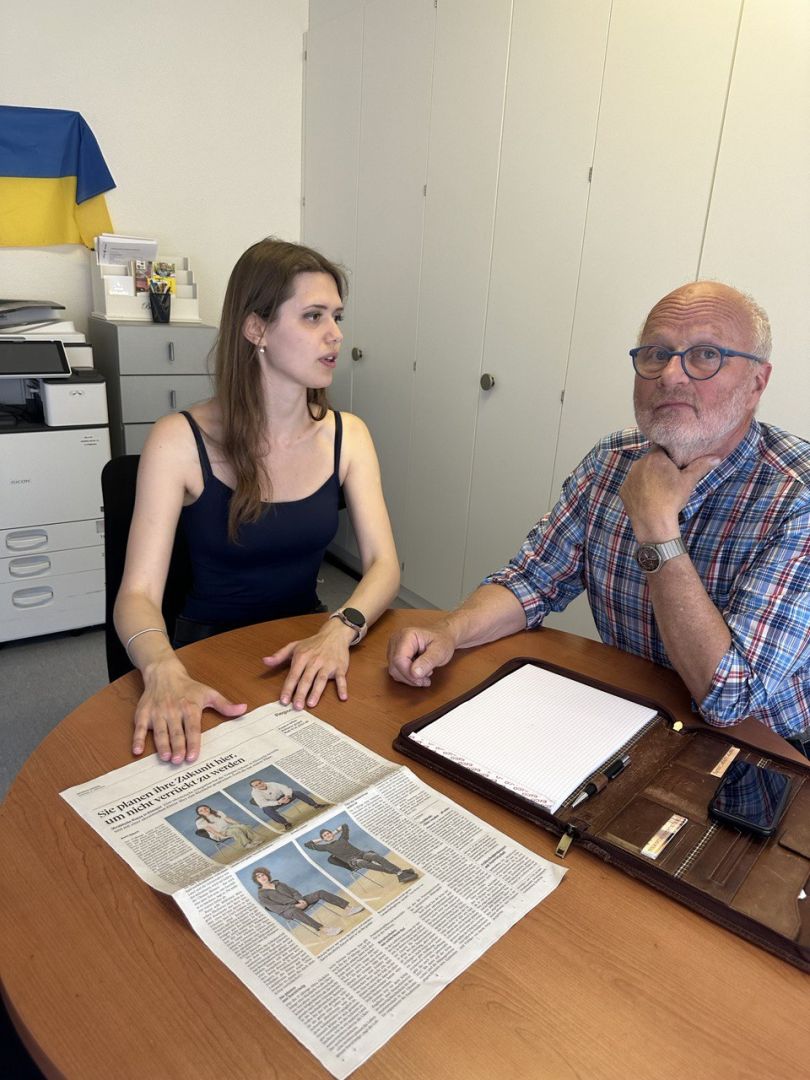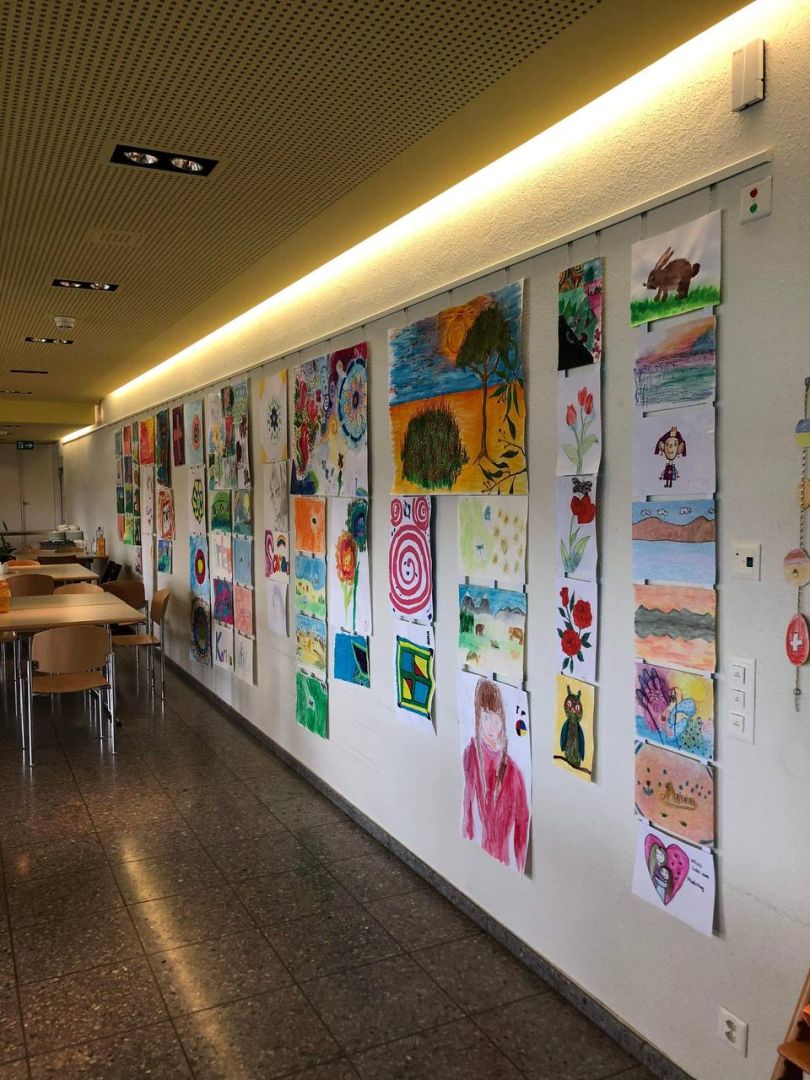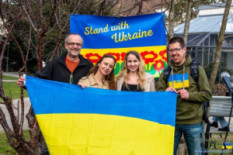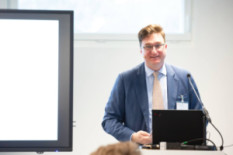Despite the ongoing war, your project in Ukraine continues, and you also care for many Ukrainians in Switzerland. Tell us about yourself and what your projects represent. Let's start with those related to your professional activities.
I am a mechanical engineer specializing in energy technologies. Since 1991, I have worked on numerous projects in various Eastern European countries. The management of these projects was overseen by SECO (State Secretariat for Economic Affairs of Switzerland), and I served as an energy consultant for SECO. Over the past 12 years, I have been implementing projects in two Ukrainian cities, Vinnytsia and Zhytomyr, on behalf of our government. We introduced the European Energy Certificate there and an energy management system based on Swiss standards. The project in Vinnytsia was completed several years ago, while the one in Zhytomyr is still ongoing and is expected to be completed by the end of this year.
Additionally, we organized training for Ukrainian experts on various energy issues and a small investment component, which involved reconstructing and renovating district heating systems in the cities. Furthermore, we are installing new systems and constructing boiler houses that operate on natural gas, wood, and renewable energy sources, along with new distribution pipelines and substations. In Zhytomyr, we have also restored five kindergartens.
Despite the war, you are still continuing to work in Ukraine?
Yes, it's remarkable, but the project in Zhytomyr is still ongoing. Most workers are on-site, although some teams have been reduced because their employees are in the military. Nevertheless, we are still able to work on the project.
What can you tell us about your experience in Ukraine, considering the country's reputation regarding corruption? Was it challenging, and did you encounter obstacles to overcome?
We understand the challenges associated with private business in Ukraine, but in our case, the project is 80% financed by the Swiss government and 20% by the city council of Zhytomyr. In other words, we are not a private business. Additionally, we brought materials and equipment from abroad and collaborated with international suppliers (the leading supplier for Zhytomyr was an Italian company). So the money did not go directly into Ukraine, and we did not encounter any corruption. Local investments were not within our responsibility zone, so we cannot confirm or deny any wrongdoing regarding them.
Our cooperation with the city government and local enterprises was quite good. We did not encounter significant problems. We were never asked to do anything improper. There may have been an understanding that any unlawful behavior could lead to the loss of the project, but fortunately, that was not an issue.
The total investment volume in Vinnytsia, as well as in Zhytomyr, amounts to approximately 20 million Swiss francs.

How has your project changed since the start of the war? How has it impacted you, particularly regarding refugee issues?
The war has had a significant impact on the project, particularly in terms of movement and delivery restrictions. Fortunately, we brought the main components to Zhytomyr before the war started. Our Italian suppliers are reluctant to travel to Ukraine due to security concerns, so we address essential tasks through video conferences.
Another significant impact of the war on the project is the shortage of electricity, which hinders the factory's operation. However, despite these challenges, we have resolved to overcome them.
In addition, the local authorities cannot continue funding due to the state of war restrictions. This is also a direct impact of the war. In this regard, Switzerland has shown great flexibility by providing additional funding to pay for the work of local contractors. This has resulted in delays, but we are confident that we will still be able to complete the project by the end of the year.
Regarding refugees, we offered our Ukrainian partners and friends to come to Switzerland when the war started. Recently, it has been a year since the arrival of the first bus with Ukrainians, the majority of whom were women and children. I met them at the Ukrainian-Polish border and arranged for them to stay with Swiss families. During that trip, we received a letter from the mayor of Zhytomyr, who appealed to the Swiss embassy to assist families whose children have cancer and require medical help. I contacted the children's hospital in Zurich and the community of Küsnacht to arrange for assistance. They immediately agreed.
Later, I met two more buses from Ukraine, which brought 80 mothers with children. They are currently staying in Sonnenhof, an old pension for the elderly that was no longer in use. We have accommodated over 100 individuals, including a group of refugees from Lutsk, among whom there are people with disabilities. Although about 70 individuals have already returned home, around 65 newcomers maintain our population at about 110.
Who funds this project? Is it the community or the government?
The community of Küsnacht provides funding for Sonnenhof, and the refugees receive social assistance from the government, a portion of which covers living expenses. While we also receive voluntary donations, the government budget mainly funds the project.
Have you been involved in social projects before?
Actually, no. My main social project has always been my family. I have four children. However, from age 20 to 50, I served as an officer in the Swiss army, where I learned to work with different types of people and became accustomed to being responsible for many individuals. This experience has helped me in working on the Sonnenhof project. And when we received a letter from the mayor of Zhytomyr asking us to take in children, I immediately said "yes," not knowing exactly what it would entail. I believe that in such situations, everyone should make their contribution. This is what we can do, so we are doing it.
How has your life changed since then? It's a very emotional story.
My life has completely changed. I am 70 years old and should already be retired, but the project in Zhytomyr is still ongoing, and I am still working. And I enjoy it. It's a fulfilling job, and what we are doing makes sense and has a positive impact.
Recently, we celebrated the anniversary of the Sonnenhof project. Although, perhaps it's worth using the word "celebrate" cautiously. But it was a family event with the residents of Sonnenhof, the mayor of Küsnacht, a doctor from the children's hospital, and those involved in the project. The mayor of Zhytomyr also joined us via video call.
I suppose you also involved many friends and the community in this project?
In Küsnacht, we have a community of volunteers organized by the municipality. There is an employee responsible for volunteer work in general. He has around 120 volunteer contacts who are ready to help. When I need assistance, I turn to him or the community worker, and we get volunteers who assist us. Without them, all of this would not have been possible.
Additionally, the Küsnacht community has hired three Ukrainian women. Anna is my right hand and the mother of Sonnenhof. She is responsible for all internal matters and communication since I still cannot speak Ukrainian, and our Ukrainians cannot freely converse in German or English. We also have Anastasia, or Nastya, our medical secretary. She is responsible for organizing daily visits to doctors and hospitals, which can reach five to six per day. We also have Valentina, a female driver, and her husband, who assist us with transportation. The community has been involved and compensated for all of them.

This story is very moving and powerful. Please tell me more about this beautiful communication experience. I am writing a dissertation on communication and am currently amazed at how people from different cultures with different mindsets find shared values.
Communication skills are more important than technical skills for an engineer. Language is the key. I need to speak multiple languages, and I am grateful I can speak English, German, Italian, French, and some Romanian. Here's another advice: try to understand the person you are communicating with. It's not always easy, but it's essential to make an effort to understand their professional and social environment and their perspectives. Thanks to over 30 years of working experience in Eastern Europe, I am familiar with the culture and social situation there. However, for those who haven't been there, for example, my wife, it can be challenging to understand these people. But for me, it's all part of my experience, and I know how things work in Eastern Europe since I have been to almost every country there.
What is most characteristic of the Eastern European or Ukrainian mentality?
The question is rather complex. I enjoy working in Eastern Europe. My interest began during my military service, where we were taught that the main enemy could come from the East, so I was curious to learn more about their culture and way of life. Therefore 1991, when the Iron Curtain fell, I started working there and establishing connections. Since then, I have developed a love for the culture, food, and people. However, one of the main differences I still observe, which is a real challenge, is the Eastern Europeans' belief in hierarchy. My Eastern European friends, including Ukraine, firmly adhere to this hierarchical system. They tend to trust and follow what comes from higher levels without questioning it.
Yes, that's part of our post-Soviet…
Yes, exactly. And I still feel it very strongly. It's a significant difference compared to us. We are much more cautious about it.
It's an excellent time for us to learn how communities work here in Switzerland, and it's a unique experience that we will apply in Ukraine.
What else are you focusing your efforts on right now?
Aside from my professional activities, I have a hobby - horse breeding. About two years ago, a colleague from the Swiss embassy in Ukraine found out about my interest. She then asked if I could develop a project using equine-assisted psychotherapy for children and veterans affected by the war in the Donetsk and Luhansk regions. At first, I was hesitant because I did not know psychotherapy. However, I met someone in Switzerland who works in this field, became interested, and decided to try it. Currently, I'm collaborating with the NGO Caritas Space, which is actively involved in similar projects worldwide, and a professor from the University of Basel specializing in animal-assisted therapy for traumatized individuals. We aim to implement this project near Zhytomyr, on Caritas Space's land. It will be an animal-assisted therapy educational center, mainly focused on horses. Caritas Space has used this location for many years to organize summer camps for children from low-income families or those who have faced difficult situations. Architects are currently working on plans for the center, and the next step will be assessing the cost and securing project funding.
However, I have already found some potential funding opportunities. This is a social project that I am working on, and I hope that we can make it happen. Our center will provide three weeks of residential therapy per year for around 400 children, and approximately the same number of children will come from the region to undergo treatment and return home immediately.
Thank you very much. Your life story is truly unique: your work experience, hobbies, and intercultural understanding are all excellent examples for many people.
I believe that not everyone can do what I do, but everyone should contribute, using their knowledge and skills.
Thank you, Alexander. I am grateful for your support and openness. This is what matters most right now.







